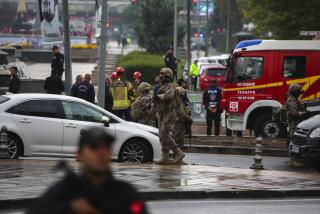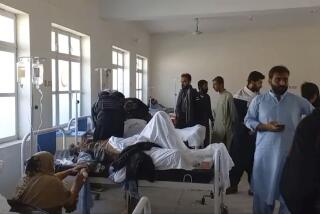24 Iraqis killed in two suicide attacks
BAGHDAD — Two suicide bombings killed at least 24 people and injured up to 100 others north of Baghdad on Tuesday, the latest attacks to take aim at Iraqi security forces and local volunteers credited with helping to bring about a major drop in violence in former insurgent strongholds.
The attacks in Baiji and Baqubah shattered a period of relative calm as Muslims marked the four-day Eid al-Adha festival, which began last Wednesday for Sunnis and Friday for Shiites. For the first time, the government extended the holiday until Tuesday, when the country’s tiny Christian minority celebrated Christmas.
Insurgents have increasingly turned their guns on volunteers, many of whom once fought alongside them. Northern Iraq has suffered many such attacks, as insurgents pushed out of Baghdad and Anbar province seek to establish footholds in the region. Residents in Baqubah said leaflets had been circulated urging them to kill volunteers.
In Tuesday’s worst attack, a suicide bomber blew up a truck at a checkpoint in Baiji, site of a major oil refinery, 125 miles north of the capital. Police and hospital officials said at least 25 people were killed and 75 injured. The U.S. military put the toll at 20 dead and 80 injured.
The blast, on a road leading to an oil industry housing complex, ignited cooking gas being sold nearby, police said. A series of secondary explosions collapsed walls, shattered windows and scattered burning canister pieces for hundreds of yards.
Iraqi security force members and local volunteers who were manning the checkpoint were among the dead. But most of the victims were civilians, including women and children who had gathered to buy the fuel, hospital officials said.
“What kind of Islam is this?” asked Ali Arkan, who was asleep in his bed when a large piece of glass smashed into his shoulder. “Surely this is not the Islam that we know. These days we are living are very holy days for Muslims and Christians. . . . Those people have no respect and no relationship with either Christianity or Islam.”
He spoke by phone from a hospital bed in Tikrit, where he was taken after the blast.
Khalaf Muhsin had just finished breakfast with his family when the explosion sent pieces of brick, shards of glass and chunks of concrete through his house. He lashed out at the assailants who targeted the security forces and local volunteers.
“Those are our sons who volunteered to protect us,” he said. “From where have these hands come to kill us?”
The Interior Ministry in Baghdad fired the Baiji police chief and declared an immediate curfew in the city.
In Baqubah, 35 miles northeast of Baghdad, police said a suicide bomber detonated explosives strapped to his waist during a funeral procession for a member of the volunteer force and his adult son. At least four people were killed and 21 injured, they said.
Police and two members of the volunteer force, known locally as the Awakening, said U.S. troops had mistaken the father and son for Sunni Muslim militants and shot them the previous night.
“It was nighttime,” said an Awakening street commander, who asked to be identified only by his first name, Khalid. “One of them was carrying a weapon, but he was not wearing a sash to distinguish him as with the Awakening.”
The U.S. military said that it had killed two “unknown enemy,” one of whom turned out to be a member of the Awakening group, which American forces also call “concerned local citizens.” Four other people were detained during the raid, the military said in a statement.
Such killings by U.S. troops threaten to undermine cooperation between American forces and local tribesmen, a linchpin of the U.S. strategy to defeat Sunni and Shiite extremists in Iraq. Last week, Sunni tribesmen in Anbar held a brief demonstration in the provincial capital, Ramadi, to protest the stabbing death of an Iraqi policeman during a fight with a U.S. Marine.
The Shiite-led central government, which has been slower to embrace the strategy of making use of the volunteers, worries that insurgents have infiltrated the ad hoc force, which has grown to more than 70,000 in a matter of months.
Iraqi Defense Minister Abdul-Qader Mohammed Jassim Mifarji warned at a recent news briefing that the government would not tolerate a “third force.”
U.S. officials have said there are plans to absorb about 20% of the volunteers into the Iraqi police and army. They plan to spend $155 million to help create jobs and provide vocational training for the rest, and they say the Iraqi government has pledged to match that amount.
In other developments, Turkey unleashed airstrikes against Turkish Kurd separatist guerrillas in northern Iraq for the third consecutive day. The Turkish warplanes flew less than two miles into Iraqi airspace and bombed an area with no civilian population, according to Iraq’s semiautonomous Kurdish regional government.
Iraqi officials had no information on possible casualties among militants of the Kurdistan Workers Party, or PKK, which has fought the Turkish government since 1984 for autonomy for Turkey’s Kurdish minority. A similar military raid Dec. 16 killed at least one civilian, injured several others and caused hundreds to flee their homes.
Elsewhere, U.S.-led forces killed 13 suspected insurgents and detained 27 in Baghdad and north of the capital in the preceding 48 hours, the military said in a statement.
Times staff writer Raheem Salman in Baghdad and special correspondents in Baghdad, Irbil, Samarra and Tikrit contributed to this report.
More to Read
Sign up for Essential California
The most important California stories and recommendations in your inbox every morning.
You may occasionally receive promotional content from the Los Angeles Times.










